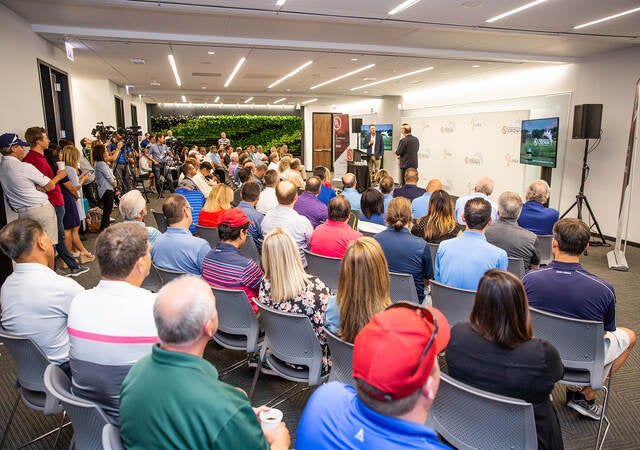Think big. Envision a world that is safer, more secure and sustainable. Our strategy is guided by our mission: working for a safer world. We grow our core capabilities and thoughtfully expand into adjacent industries, foster exceptional customer relationships, build collaborative partnerships with leaders in industry, science, academia and government, and hire top talent. Our strategic actions fuel our Ambition to lead in every business, and deliver measurable value to all of our stakeholders.
"With our F.E.W. Baltic II project, we will contribute significantly to Poland’s green energy transition and accelerate the local supply chain development. We are excited to extend our reach in the offshore wind sector and work with UL Solutions to help make that happen.”
Defending against cyberattacks on distributed energy infrastructure
As the U.S. electric grid transforms to integrate clean energy sources and increase its resiliency, electric consumers are adopting smart home devices that can help them reduce their energy use and costs. Although these advancements offer many potential benefits to individual consumers, society and the environment, they also introduce cybersecurity risks. UL Solutions and the U.S. Department of Energy (DoE) National Renewable Energy Laboratory (NREL) worked to close this gap by co-authoring robust cybersecurity recommendations for DER and IBR devices. This work led to the creation of UL 2941, the Outline of Investigation for Cybersecurity of Distributed Energy and Inverter-Based Resources, empowering industry stakeholders to design cybersecurity into these critical systems, evaluate the cybersecurity of DER or IBR devices before they connect to the grid and defend against new cybersecurity threats in the field.
Enhancing the smart home user experience and energy savings
Propelled by consumers’ desire to save money and reduce their environmental impact, the demand for and adoption of innovative, energy-efficient smart home products has surged in recent years. Baltimore Gas and Electric’s Connected Home and Small Business prototype achieved the Energy Star® Smart Home Energy Management Systems (SHEMS) Certification, making it the first product in the market to achieve the certification from UL Solutions. Energy Star® SHEMS limit the necessary standby power of connected devices through features such as scheduling, remote device control and automated device control based on occupancy detection. Not only do these features enhance the convenience and overall user experience of smart home products, but they also help users save energy and costs.
Driving innovation and trust in the automotive industry
Manufacturers and suppliers must maintain a rapid pace of innovation while building and maintaining trust to be competitive in the automotive and mobility market. What’s more, they must meet growing consumer expectations for connectivity, interoperability, transparency, safety and integration of new electric and autonomous vehicle technologies. The Netherlands Vehicle Authority has designated UL Solutions as a technical service for auditing and testing vehicles for compliance with two key United Nations automotive cybersecurity regulations that establish clear performance and audit requirements for manufacturers in 64 countries, including Japan, South Korea and the countries comprising the EU and the U.K.
Streamlining the path to energy storage systems compliance
Turnkey energy storage systems help supercharge independent power producers’ progress toward renewables targets. UL Solutions has created a certification service to evaluate energy storage equipment subassemblies (ESESs) for compliance with UL 9540, the Standard for Energy Storage Systems and Equipment. This service offers a fast, flexible and cost-effective path to certification by allowing manufacturers to procure certified components from equipment suppliers to create their energy storage systems.
Digital Human Factors Engineering Platform for Medical Device Manufacturers
Incorporating human factors engineering (HFE) processes into medical device development helps manufacturers meet regulatory requirements in key global markets, as well as enhance device safety, usability and effectiveness. Emergo by UL’s web-based platform, The Optimal Product Usability Suite™ (OPUS), provides medical device and technology manufacturers easy and cost-effective access to HFE training, tools and capabilities that many companies are challenged to develop on their own.
Bolstering confidence in real-time payments security
By offering improved visibility into payments, cash management and liquidity, real-time payments can benefit financial institutions, merchants and consumers alike. Although real-time payment systems are gaining ground in U.S. markets, many smaller financial institutions have yet to embrace them. To address this gap, the Federal Reserve is developing FedNow, a new instant payment system that enables financial institutions across the U.S. to provide safer and more efficient instant payment services. UL Solutions and Iliad Solutions combined forces to strengthen security and confidence in real-time payments systems and prepare financial systems to transition to the FedNow Service, set to launch in 2023.
Ushering Poland’s transition from fossil fuels to renewable energy generation
Constructing offshore wind farms marks a pivotal step toward decreasing dependence on fossil fuels in favor of clean, renewable energy sources. RWE Offshore Wind Poland has chosen UL Solutions for the initial steps of a project certification for a 350 MW wind farm in the Polish Baltic Sea, F.E.W. BALTIC II. One of the first projects to be realized in the region, F.E.W. BALTIC II will be capable of producing enough electricity to supply the equivalent of approximately 350,000 Polish households’ electricity needs once fully operational.
Improving aviation support equipment safety and environmental impact
Airports rely on ground support equipment (GSE) for critical aircraft operations. Although transitioning to lithium-ion battery-powered aviation, GSE helps airports reduce the environmental impact of these operations; lithium-ion batteries also introduce safety risks. UL Solutions launched a new service evaluating lithium-ion battery-powered aviation GSE to meet UL 5840, the Standard for Electrical Systems of Battery Powered Aviation Ground Support Equipment, which addresses the risk of fire, electric shock and explosion hazards associated with this technology. By offering this service, we help empower the aviation industry to streamline the safe adoption of lithium-ion battery-powered GSE and meet carbon emission reduction goals.
Enhancing the efficiency of EV battery enclosure material testing
UL Solutions introduced a new testing method to help original equipment manufacturers (OEMs) save time and money as they transition to using lighter-weight plastics and composites to house electric vehicle (EV) batteries. To minimize expenses and avoid potential safety concerns, OEMs must choose an appropriate enclosure material before building a costly prototype. Because materials used to house EV batteries must be able to withstand the high temperatures and mechanical impact stresses of a battery thermal runaway event, we introduced the torch and grit (TaG) test. This testing method incorporates small-scale testing that helps predict performance in a thermal runaway event. By ranking materials, TaG can reduce the number of materials needed to undergo large-scale prototyping and validation tests, which can prove costly and time-consuming for OEMs.
“In the built environment, it is critical to efficiently leverage and access data to help advance safe, smart and sustainable buildings. Linking information to UL Solutions presents a more holistic view of a building.”
Improving data transparency with software designed for building and construction customers
Building owners, occupants, staff and visitors prioritize building health and wellness as a critical factor as more people return to in-person work. Reducing risk and costs associated with occupant health issues can help improve productivity and increase a building and company’s value. To help customers manage and leverage data to promote smarter, safer and more sustainable buildings, UL Solutions partnered with StratusVue to develop StratusVue’s StratusLink™ powered by UL Solutions. StratusLink™ powered by UL Solutions will link construction asset information to product and life safety data in the UL Product iQ® and UL SPOT® databases, providing visibility into potential problems so our building and construction customers can address them early and with documented answers.
Solving smart device interoperability challenges
Smart home devices manufactured by different companies do not always work together — you may not be able to switch on your smart lights with voice control if your smart home assistance device brand doesn’t work with your smart light bulb brand. The Connectivity Standards Alliance’s (CSA’s) new, universal connectivity standard, Matter, solves this problem. Its open-source protocol allows users to connect different devices and mobile apps to work together. UL Solutions added Matter standard testing capability to our comprehensive testing services — including Bluetooth®, Zigbee and Thread testing — for manufacturers of connected smart devices in the Internet of Things (IoT) space.
Building trust across dangerous goods supply chains
Many of today’s most in-demand products, from cell phones to hoverboards, contain lithium-ion batteries, which the U.S. Department of Transportation (USDOT) categorizes as hazardous. The increased market demand for lithium-ion battery-powered products has contributed to an uptick in thermal runaway events — a battery’s self-heating chain reaction that threatens the safety of shipping crews, passengers and the general public. To help companies mitigate the safety risks associated with lithium-ion batteries, UL Solutions developed the industry’s first dangerous goods process management (DGPM) certification. The DGPM certification program allows organizations to demonstrate conformance to USDOT Hazardous Materials Regulations and verify that appropriate processes are in place for moving dangerous goods. This new program leverages our cross-functional safety science expertise, data and third-party auditing services to foster transparency and trust throughout the supply chain.
Designing grid-connected distributed energy generation projects
Energy storage plays a growing role in today’s microgrids, providing benefits such as electrical supply resiliency and financial advantages. Energy professionals need more flexible tools for evaluating renewable energy systems’ technical and financial feasibility and potential performance. UL Solutions launched new features of HOMER Grid, our trusted software for designing grid-connected distributed generation projects, to help fill this critical need. Now with added detail in cost calculations and greater ease and flexibility in setting utility tariffs, HOMER Grid release 1.9 offers energy professionals robust tools to complete more accurate cost and performance evaluations for a given distributed energy project.
Expanding smart building assessment and verification
Smart buildings hold the potential to transform our communities. However, they also introduce unique cybersecurity, connectivity, health and sustainability challenges. Driven by the increasing demand for smart building assessment and verification, UL Solutions announced a program to empower third-party building professionals to broaden their skillsets and businesses by learning to conduct a SPIRE Smart Building Assessment™. The SPIRE™ Qualification Program is designed to scale the SPIRE program and help experienced consulting and design firms in the building industry address the impactful gap in smart building assessment.
Evaluating battery enclosure materials to help enhance the safety of electric vehicles
As the electric vehicle (EV) market continues to evolve, the automotive industry has increasingly focused on the critical safety risks of thermal runaway and the importance of using optimal enclosure material to protect against this phenomenon. UL Solutions introduced the Battery Enclosure Thermal Runaway (BETR) evaluation, UL Solutions’ first material screening test method for evaluating EV battery enclosure material. We evaluate material performance by simulating a thermal runaway scenario and can screen multiple formulas, reducing test costs and development time. With this offering, we address salient industry concerns by helping original equipment manufacturers (OEMs) meet their needs while considering materials’ performance.




















.jpg?itok=ffHmNSEp)
.jpg?itok=ntNm_msD)
